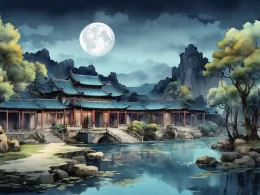Oft I roam and forget return—
How more so in this hidden land.
I wash my hair in crystal springs,
Beneath the moon, too charmed to stand.
Still more I love the angling sage,
So still—like a heron on the sand.
We talk of hearts like drifting clouds,
And dream of shores a thousand spans.
The marshland fires have all burned low,
And dawn creeps o’er the autumn hill.
We part like birds from separate boughs—
Ah, when shall we rejoin at will?
Original Poem
「蓝田溪与渔者宿」
钱起
独游屡忘归,况此隐沦处。
濯发清泠泉,月明不能去。
更怜垂纶叟,静若沙上鹭。
一论白云心,千里沧州趣。
芦中野火尽,浦口秋山曙。
叹息分枝禽,何时更相遇?
Interpretation
This poem was composed during the flourishing Tang Dynasty, when scholars often found themselves torn between political engagement and reclusive aspirations. During his travels along Lantian Creek, the poet Qian Qi happened to lodge at a fisherman's dwelling, where amidst clear springs, bright moonlight, wild fires and autumn mountains, he experienced a transcendent tranquility and freedom from worldly concerns. Centered around a night spent with the fisherman, the poem paints an idyllic natural landscape and portrays the spiritual resonance between the poet and recluse, expressing both his yearning for hermitic life and profound reflections on life's choices.
First Couplet: "独游屡忘归,况此隐沦处。"
Dú yóu lǚ wàng guī, kuàng cǐ yǐn lún chù.
Solitary wanderings often make me forget my return,
How much more this retreat where recluses sojourn!
The opening reveals the poet's longstanding reclusive inclination. His habitual forgetfulness during solitary travels intensifies upon encountering this "hidden dwelling," where the environment perfectly mirrors his inner world, naturally evoking his reluctance to leave.
Second Couplet: "濯发清泠泉,月明不能去。"
Zhuó fà qīng líng quán, yuè míng bù néng qù.
Washing my hair in the crystal-cold spring,
Under this radiant moon - impossible to depart.
Through sensory details of nature's beauty and physical purification, the spring's clarity and moon's brilliance symbolize mental serenity and emotional fulfillment, intensifying the "cannot leave" psychological state.
Third Couplet: "更怜垂纶叟,静若沙上鹭。"
Gèng lián chuí lún sǒu, jìng ruò shā shàng lù.
Most endeared is the old angler,
Still as an egret on sandbars.
The silent fisherman, serene and transcendent like a painted image, embodies profound Zen-like tranquility that earns the poet's sincere admiration, reflecting his own reclusive aspirations while harmonizing man with landscape.
Fourth Couplet: "一论白云心,千里沧州趣。"
Yī lùn bái yún xīn, qiān lǐ cāng zhōu qù.
All night discussing cloud-free hearts,
A thousand miles of riverside delight envisioned.
Transitioning from stillness to spiritual communion, the all-night conversation about reclusive joys uses "cloud-like heart" to symbolize unfettered freedom and "riverside delight" to evoke longing.
Fifth Couplet: "芦中野火尽,浦口秋山曙。"
Lú zhōng yě huǒ jìn, pǔ kǒu qiū shān shǔ.
Marsh fires die in reed beds,
Autumn mountains at dawn greet the creek mouth.
Night quietly fades into morning light - so immersed were they in conversation and nature that time became meaningless, creating lingering poetic resonance.
Sixth Couplet: "叹息分枝禽,何时更相遇?"
Tàn xī fēn zhī qín, hé shí gèng xiāng yù?
Sighing like birds parting on branches,
When shall we meet again?
The concluding emotional outpouring uses "branch-parting birds" to metaphorize rare encounters and inevitable separations, elevating a night's lodging into meditation on the rarity of finding kindred spirits in life's journey.
Holistic Appreciation
This poem unfolds with clear structure and distinct layers, centering on the poet's overnight stay with a fisherman. It delicately portrays the natural beauty of Lantian Stream, the fisherman's serene elegance, and the profound spiritual connection forged through their conversation. From solitary wandering to moonlit reluctance to part, then to heartfelt late-night talks and emotional resonance, it culminates in a dawn farewell—creating an atmosphere where tranquility and movement intertwine, each infused with deep emotion.
The poet does not merely depict scenery; through his portrayal of this reclusive haven and its inhabitant, he expresses a heartfelt yearning for a hermit's life. His intellectual rapport with the fisherman reflects a scholar's dual pursuit in a chaotic world: the search for kindred spirits and pure spiritual refuge. This sentiment peaks in the closing rhetorical question—"When shall we meet again?"—blending parting sorrow with boundless longing for an idealized existence.
Artistic Merits
- Novel Concept, Unique Perspective: Rather than focusing solely on the "fisherman" archetype, the poem centers on "lodging with a fisherman," capturing the shared night’s conversation and camaraderie—a fresh approach.
- Fusion of Scene and Sentiment: Images like washing hair in spring water, moonlight delaying departure, egrets guarding fishing boats, and wildfires on autumn mountains interweave with emotion, suffusing the poem with natural beauty and inner peace.
- Natural Allusion, Subtle Depth: The phrase "heart like white clouds" subtly echoes Tao Yuanming’s "clouds drift aimlessly from the gorge", conveying the recluse’s detachment—a fitting metaphor, powerfully evocative.
- Precise Closure, Emotional Elevation: The ending compares parting to "birds dividing branches"—tender and poignant, prompting reflection on life’s rare encounters with true companions.
Insights
Through serene landscapes and profound life insights, this poem reveals an idyllic vision of existence and the preciousness of genuine human connection. It reminds us that amid worldly clamor, maintaining a "heart like white clouds" and aspiring to "the charm of river isles" is not escapism but a pursuit of inner purity and life’s essence. Moreover, it underscores how authentic encounters, however fleeting, leave enduring imprints—illuminating our path forward with their memory and spiritual resonance.
About the Poet
Qian Qi (钱起, c. 722-780), a native of Huzhou, Zhejiang, was the foremost of the "Ten Talents of the Dali Era" in mid-Tang poetry. His poetic style, inheriting Wang Wei's legacy, excelled particularly in regulated verse (五律), characterized by its ethereal elegance. Yan Yu praised his work as "innovative in form," reflecting the Dali period's transition from the High Tang's naturalism to refined craftsmanship.











